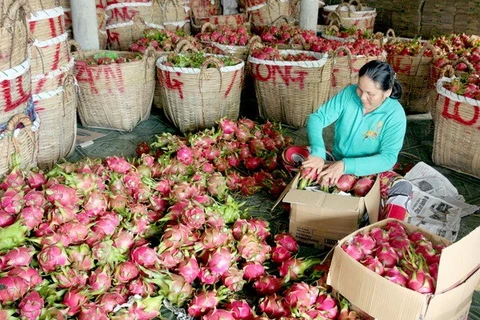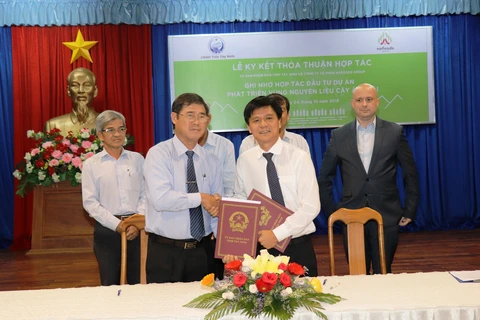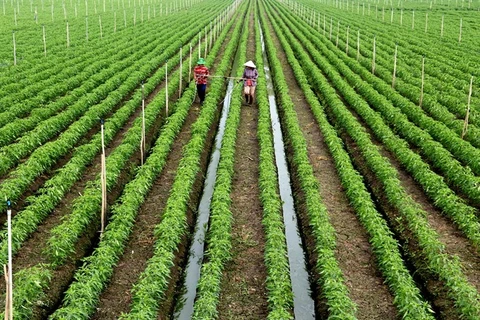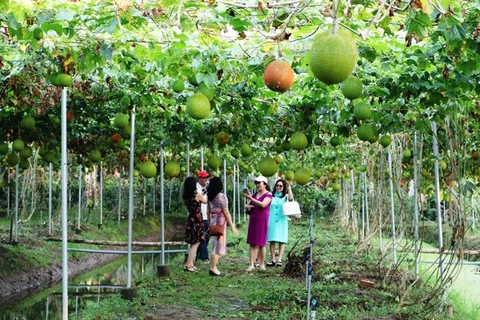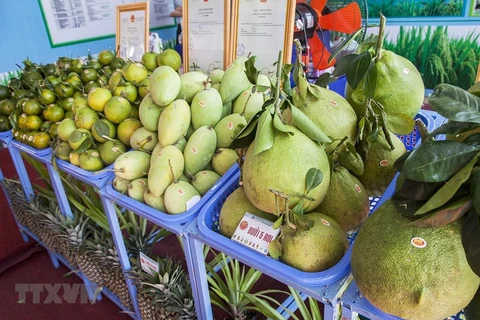 Farmer Vo Van Nang hangs a board on a tree in his xoan orange orchard in Tan Thuan Dong commune of Cao Lanh city, Dong Thap province (Photo: VNA)
Farmer Vo Van Nang hangs a board on a tree in his xoan orange orchard in Tan Thuan Dong commune of Cao Lanh city, Dong Thap province (Photo: VNA) Dong Thap (VNS/VNA) - The Mekong Delta province of Dong Thap is encouraging farmers to grow more fruits to good agricultural practice (GAP) standards to improve incomes and sustainability.
It has more than 600ha of VietGAP- and GlobalGAP-standard orchards, according to Nguyen Phuoc Thien, Deputy Director of the provincial Department of Agriculture and Rural Development.
Mango and longan account for the lion’s share of these fruits. The mangoes are exported to many markets, including the Republic of Korea, Japan, Russia, Italy, and Hong Kong.
The province, the delta’s largest mango producer, has more than 9,000ha under the fruit, while mango is one of its key agricultural products.
Farmers who grow mango to VietGAP standards earn 200-220 million VND (8,620-9,460 USD) per hectare per year while those who grow traditionally earn 150-160 million VND (6,450-6,890 USD), according to the department.
The province has also designated six areas with a combined area of 416ha in Cao Lanh city and Cao Lanh district to grow clean mangoes in the off-season to avoid oversupply during the main season.
It has in fact designated specific areas for specific fruits such as for longan in Chau Thanh district, pink mandarin in Lai Vung and xoan orange in Lap Vo and Lai Vung districts.
The province, which had more than 25,000ha under fruits as of 2017, plans to expand this to 30,057ha by 2025, including 11,055ha of mango, 8,460ha of various citrus fruits and 5,720ha of longan.
In 2016, the My Xuong Mango Cooperative in Cao Lanh district began selling mango trees to customers through its website, https://xoaicaolanh.com.vn, thus offering a steady income to its members and clean fruits to consumers.
The trees sold under the “My home mango tree” model, cost customers 3-5 million VND (129 – 215 USD) a year per tree depending on their previous yields. Customers can get 100 – 150kg of mangoes for a year from their tree.
In case of a poor harvest, customers still get 70 percent of the quantity guaranteed in the contract.
The mango trees sold under the model belong to three varieties: local specialties Hoa Loc and Cat Chu and Taiwanese variety xoai tuong da xanh.
The mango trees sold online meet criteria like having fruits that are consistent in size, fruiting well and meeting VietGAP standards.
When a tree is sold, its owner is responsible for tending the tree, pick ripe fruits and deliver them to the customer.
The trees sold on the website are assigned a number, and buyers can check their current status on the website.
Nguyen Van Truyen, who was one of the first members of My Xuong to take part in the model, said: “The model helps assure farmers against price declines when there is a bumper harvest since the price is set at the time of the purchase.”
The cooperative’s members have so far sold more than 230 mango trees to customers, earning more than 900 million VND (28,770 USD). Many of the buyers are from HCM City and Hanoi.
Vo Viet Hung, Director of the My Xuong Mango Cooperative, said: “The buyer can purchase a mango tree on the cooperative’s website, and after the purchase the cooperative will take care of all the rest for the buyer.”
The success of “My home mango tree” spurred the launch of “My home orange tree” last year by farmer Vo Van Nang in Cao Lanh city’s Tan Thuan Dong commune.
Planted in 2012, Nang’s orange orchard has more than 200 xoan orange trees which each yield 80 -100 kilogrammes of sweet and juicy fruits a year. He does not use chemical fertilisers or pesticides in his orchard.
The trees are sold on the website https://nongsancaolanh.vn with similar conditions as My Xuong.
Last year he sold 35 orange trees at a price of 4 million VND (170 USD) each for a period of a year. Fifty trees have been bought so far this year.
According to Le Nhut Truong, Chairman of the Tan Thuan Dong Commune People’s Committee, Nang’s model of producing clean products is an example the commune encourages its farmers to emulate.
It plans to instruct farmers to grow clean produce to meet the market demand and improve value.
Le Thanh Huy, head of the Cao Lanh City Economic Bureau, said "The 'My home orange tree' model produces clean fruits and is environment-friendly. It also helps promote the city’s agricultural produce."-VNS/VNA
VNA
